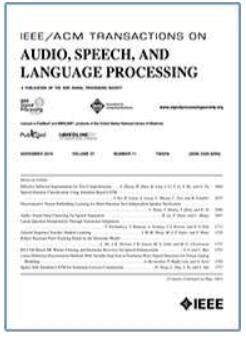An Interpretable Deep Mutual Information Curriculum Metric for a Robust and Generalized Speech Emotion Recognition System
IF 5.1
2区 计算机科学
Q1 ACOUSTICS
IEEE/ACM Transactions on Audio, Speech, and Language Processing
Pub Date : 2024-11-27
DOI:10.1109/TASLP.2024.3507562
引用次数: 0
Abstract
It is difficult to achieve robust and well-generalized models for tasks involving subjective concepts such as emotion. It is inevitable to deal with noisy labels, given the ambiguous nature of human perception. Methodologies relying on鲁棒广义语音情感识别系统的可解释深度互信息课程度量
对于涉及主观概念(如情感)的任务,很难实现鲁棒性和良好的泛化模型。考虑到人类感知的模糊性,处理有噪声的标签是不可避免的。基于半监督学习(SSL)和课程学习的方法被提出来增强模型的泛化。本研究提出了一种新的深度互信息(DeepMI)度量,该度量使用SSL预训练的DeepEmoCluster框架构建,以确定样本的难度。DeepMI度量量化了声学模式和情感属性之间的关系(例如,唤醒、效价和支配)。DeepMI指标提供了更好的课程,实现了比语音情感识别(SER)现有课程指标更高的最先进性能。我们在匹配和不匹配的测试条件下用三个情感数据集评估了所提出的方法。系统的实验评估表明,使用DeepMI度量训练的模型不仅获得了具有竞争力的泛化性能,而且保持了收敛稳定性。此外,提取的DeepMI值具有很高的可解释性,反映了训练样本的信息等级。
本文章由计算机程序翻译,如有差异,请以英文原文为准。
求助全文
约1分钟内获得全文
求助全文
来源期刊

IEEE/ACM Transactions on Audio, Speech, and Language Processing
ACOUSTICS-ENGINEERING, ELECTRICAL & ELECTRONIC
CiteScore
11.30
自引率
11.10%
发文量
217
期刊介绍:
The IEEE/ACM Transactions on Audio, Speech, and Language Processing covers audio, speech and language processing and the sciences that support them. In audio processing: transducers, room acoustics, active sound control, human audition, analysis/synthesis/coding of music, and consumer audio. In speech processing: areas such as speech analysis, synthesis, coding, speech and speaker recognition, speech production and perception, and speech enhancement. In language processing: speech and text analysis, understanding, generation, dialog management, translation, summarization, question answering and document indexing and retrieval, as well as general language modeling.
 求助内容:
求助内容: 应助结果提醒方式:
应助结果提醒方式:


